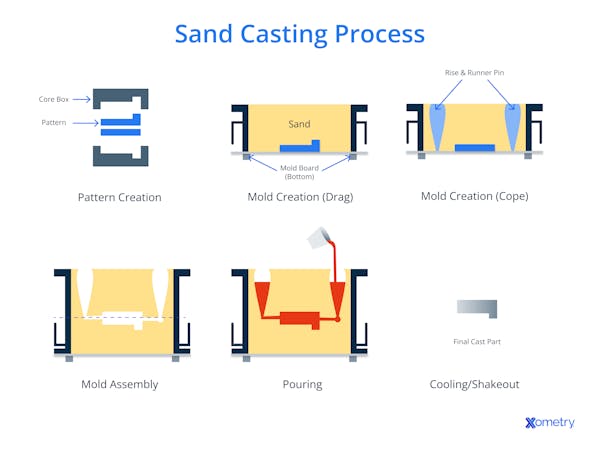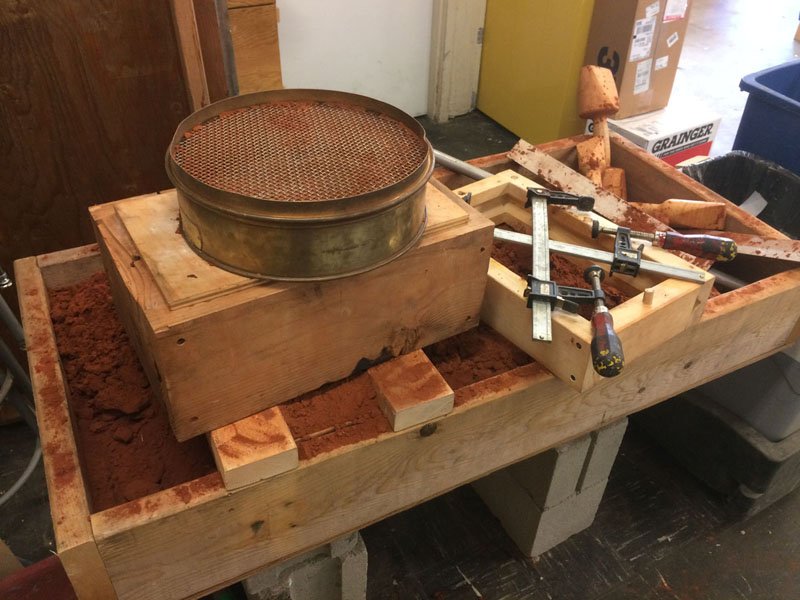Aluminum Foundry Wisconsin delivers precision casting solutions for manufacturers
Recognizing the Advantages and Innovations in the Aluminum Foundry Market
The Aluminum Foundry market plays a necessary duty in modern production. Its lightweight homes notably improve gas performance, specifically in automobile and aerospace markets. Furthermore, Aluminum's resistance to rust warranties durability in various applications. As the sector evolves, innovations such as advanced recycling and additive production are reshaping production approaches. Checking out these improvements exposes not only the advantages however likewise the obstacles in advance for Aluminum foundries in a rapidly transforming market.
The Lightweight Advantage of Aluminum
Aluminum's lightweight nature provides considerable benefits across different industries, specifically in manufacturing and transport. Its low thickness permits the manufacturing of elements that are easier to install and manage, resulting in lowered labor expenses and boosted effectiveness. In the automobile field, lighter cars add to enhanced gas economic climate and lower emissions, lining up with global sustainability objectives. Similarly, in aerospace, the usage of Aluminum lowers the total weight of aircraft, which is essential for improving efficiency and reducing operational expenses.
In addition, Aluminum's lightweight residential or commercial properties assist in innovative layouts that were formerly unfeasible with heavier products. This flexibility allows makers to produce complicated forms and structures while maintaining structural integrity. Overall, the lightweight advantage of Aluminum not only boosts item efficiency yet additionally drives innovations in technology and design, making it a preferred product in numerous applications.
Deterioration Resistance and Durability
The Aluminum Foundry industry is renowned for creating materials with exceptional corrosion resistance, making them suitable for numerous applications. This property, incorporated with boosted architectural stability, contributes to the resilient performance advantages that Aluminum elements provide. Consequently, industries significantly depend on Aluminum to satisfy demanding ecological problems without endangering quality.
Superior Deterioration Resistance
While numerous metals encounter considerable difficulties from environmental variables, Aluminum sticks out for its exceptional corrosion resistance, making it a recommended choice in several applications. This building is mainly as a result of a natural oxide layer that forms on the Aluminum surface area, providing a barrier versus wetness and harsh representatives. Unlike other steels that might rust or weaken in time, Aluminum keeps its integrity also in rough settings, such as coastal locations or commercial setups. In addition, its light-weight nature integrated with rust resistance makes it suitable for applications in aerospace, automobile, and aquatic sectors. In general, Aluminum's phenomenal toughness not only improves item longevity but likewise reduces maintenance costs, presenting a compelling advantage for makers and consumers alike.
Boosted Architectural Integrity
Engineers and designers increasingly identify the significance of boosted structural stability in modern-day applications, where both deterioration resistance and resilience are critical. Aluminum alloys, known for their lightweight buildings, also exhibit extraordinary resistance to rust, making them ideal for rough settings. The cutting-edge strategies used in the Aluminum Foundry market contribute considerably to creating parts with improved durability. Advanced casting processes and alloy structures are tailored to meet details efficiency demands, making sure that structures can hold up against severe conditions without endangering integrity. Surface treatments and finishings improve the life-span of Aluminum products, even more mitigating deterioration over time. This concentrate on enhanced architectural integrity not just extends the usability of materials but additionally lowers maintenance costs, strengthening Aluminum's position as a product of selection in various markets.
Durable Efficiency Conveniences
Lasting efficiency in Aluminum parts is mostly connected to their remarkable deterioration resistance and longevity. Unlike several metals, Aluminum normally develops a safety oxide layer, which protects against rust and deterioration in different settings, including industrial and marine setups. This fundamental residential or commercial property significantly extends the life-span of Aluminum items, decreasing upkeep and substitute expenses. On top of that, the light-weight nature of Aluminum enhances its applicability across sectors without endangering strength. The material's resistance to deterioration also adds to its dependability sought after applications, making it an optimal selection for automotive, aerospace, and construction industries. As industries increasingly focus on sustainability and durability, Aluminum's performance advantages straighten with modern-day engineering requirements, strengthening its function in innovative manufacturing processes.
Environmental Effect and Sustainability
 As the Aluminum Foundry market develops, it increasingly prioritizes environmental effect and sustainability, recognizing the requirement for liable techniques when faced with environment change. Efforts to decrease waste and energy intake are at the center, with numerous factories taking on reusing initiatives to recover Aluminum scrap. This not only minimizes basic material usage however likewise significantly lowers power expense, as recycled Aluminum calls for only a fraction of the energy compared to main manufacturing.
As the Aluminum Foundry market develops, it increasingly prioritizes environmental effect and sustainability, recognizing the requirement for liable techniques when faced with environment change. Efforts to decrease waste and energy intake are at the center, with numerous factories taking on reusing initiatives to recover Aluminum scrap. This not only minimizes basic material usage however likewise significantly lowers power expense, as recycled Aluminum calls for only a fraction of the energy compared to main manufacturing.In addition, advancements in discharges regulate modern technologies are being implemented to reduce air contaminants, straightening operations with stricter ecological laws. Shops are additionally discovering alternative power resources, such as solar and wind, to power their facilities sustainably. By cultivating cooperation with stakeholders, the sector intends to create cutting-edge options that enhance ecological stewardship. Jointly, these campaigns highlight a dedication to lowering the Aluminum Foundry's carbon footprint while advertising a circular economy within the production field.
Advanced Production Techniques
 Revolutionizing manufacturing procedures, the Aluminum Foundry industry is progressively incorporating sophisticated production techniques to enhance effectiveness and precision. Strategies such as computer system mathematical Home Page control (CNC) machining and additive production have actually become important elements in enhancing production process. CNC machining permits for high-precision element construction, greatly reducing material waste and manufacturing time. At the same time, additive manufacturing opens brand-new methods for intricate geometries and light-weight layouts that were previously difficult to accomplish.
Revolutionizing manufacturing procedures, the Aluminum Foundry industry is progressively incorporating sophisticated production techniques to enhance effectiveness and precision. Strategies such as computer system mathematical Home Page control (CNC) machining and additive production have actually become important elements in enhancing production process. CNC machining permits for high-precision element construction, greatly reducing material waste and manufacturing time. At the same time, additive manufacturing opens brand-new methods for intricate geometries and light-weight layouts that were previously difficult to accomplish.Furthermore, the deployment of automation and robotics in Aluminum shops simplifies procedures, reduces human error, and boosts employee security. These technologies help with a more receptive production atmosphere, allowing producers to adjust rapidly to market have a peek at this site needs. The combination of advanced simulation software application additionally improves the layout and testing phases, resulting in superior item top quality. Jointly, these methods not just enhance operational efficiency yet likewise foster advancement, placing the Aluminum Foundry industry at the center of modern production.
Advancements in Reusing Processes
The Aluminum Foundry sector is not just progressing in manufacturing techniques however is additionally making significant strides in recycling processes. Advancements are arising to boost the performance of reusing methods, reducing energy consumption and improving sustainability. Advanced sorting innovations, such as automatic optical sorting, enable the identification and separation of Aluminum from other materials with high precision. This results in a better of recycled Aluminum, which is necessary for keeping the honesty of the end products.
Closed-loop recycling systems are being implemented, permitting manufacturers to reuse Aluminum scrap within their very own manufacturing processes. This reduces waste and advertises a round economic climate. Furthermore, research study into brand-new recycling methods, such as hydrometallurgical processes, offers the possibility for recouping Aluminum from complex waste streams. These advancements not only add to minimizing the carbon footprint of the Aluminum Foundry industry however also strengthen its economic feasibility in a significantly environmentally conscious market.
Applications Throughout Numerous Industries
Various industries are increasingly acknowledging the versatility and advantages of Aluminum Foundry products, causing widespread applications throughout sectors such as automobile, customer, aerospace, and construction items. In the automobile sector, Aluminum castings add to light-weight car styles, improving gas efficiency and performance. Aerospace makers utilize Aluminum parts for their strength-to-weight proportion, necessary for airplane frameworks and elements.
In building and construction, Aluminum is favored for its durability and resistance to deterioration, making it ideal for window frames, roofing, and architectural assistances. Customer goods additionally gain from Aluminum Foundry products, as seen in cookware, electronic devices, and packaging, where lightweight and recyclable products are vital.
The adaptability of Aluminum Foundry methods permits specific requirements and complex layouts, providing to the varied demands of these learn this here now sectors. As an outcome, Aluminum Foundry items are ending up being important to modern-day production processes across numerous sectors.
Future Fads in Aluminum Foundries
As sectors proceed to develop, Aluminum factories are poised to welcome a number of essential trends that promise to boost effectiveness and sustainability. One famous trend is the increasing fostering of electronic modern technologies, consisting of automation and fabricated knowledge, which improve procedures and boost quality assurance. On top of that, the press towards sustainable practices is leading shops to buy reusing modern technologies, considerably decreasing waste and energy consumption.
 An additional arising fad is making use of advanced alloys and products, satisfying the expanding need for resilient and lightweight components across numerous sectors (Aluminum Foundry). Furthermore, the integration of additive manufacturing methods is expected to reinvent part layout, using personalization and minimizing lead times
An additional arising fad is making use of advanced alloys and products, satisfying the expanding need for resilient and lightweight components across numerous sectors (Aluminum Foundry). Furthermore, the integration of additive manufacturing methods is expected to reinvent part layout, using personalization and minimizing lead timesPartnership with research study organizations is also anticipated to drive development, as foundries look for to establish new processes and materials. Aluminum Foundry. Jointly, these patterns show a transformative future for the Aluminum Foundry industry, lining up with more comprehensive goals of sustainability and efficiency
Frequently Asked Inquiries
What Are the Normal Costs Connected With Aluminum Foundry Production?
The typical expenses related to Aluminum Foundry production consist of basic materials, labor, power, devices maintenance, and overhead expenses. These aspects collectively affect the total monetary investment required for effective Aluminum spreading operations.
Just How Does Aluminum Contrast to Other Steels in Strength?
Aluminum, while lighter than lots of metals, shows excellent strength-to-weight ratios. Compared to steel, Aluminum is less solid but uses outstanding deterioration resistance, making it a desirable choice in applications where weight and toughness are necessary.
What Safety Procedures Remain In Location in Aluminum Foundries?
Precaution in Aluminum foundries normally include required personal protective devices, air flow systems to control fumes, routine devices upkeep, training programs for employees, and adherence to stringent security laws to decrease threats connected with molten metal handling.
Exactly How Is Top Quality Control Managed in Aluminum Spreading Processes?
Quality assurance in Aluminum spreading processes involves extensive assessments at different stages, consisting of resources evaluation, process monitoring, and final product testing. Methods such as statistical procedure control and non-destructive screening warranty adherence to market requirements.
What Certifications Are Essential for Aluminum Foundry Providers?
The significance of certifications for Aluminum Foundry distributors consists of ISO 9001 for top quality administration, ISO 14001 for environmental administration, and industry-specific criteria like ASTM and SAE, making sure compliance, safety, and integrity in making procedures.
The Aluminum Foundry industry plays an important duty in contemporary production. The Aluminum Foundry market is renowned for creating materials with premium rust resistance, making them ideal for numerous applications. Changing production procedures, the Aluminum Foundry sector is significantly integrating innovative production methods to enhance performance and precision. The Aluminum Foundry sector is not just progressing in manufacturing methods but is also making considerable strides in recycling procedures. As industries proceed to develop, Aluminum shops are poised to welcome a number of key fads that promise to boost effectiveness and sustainability.